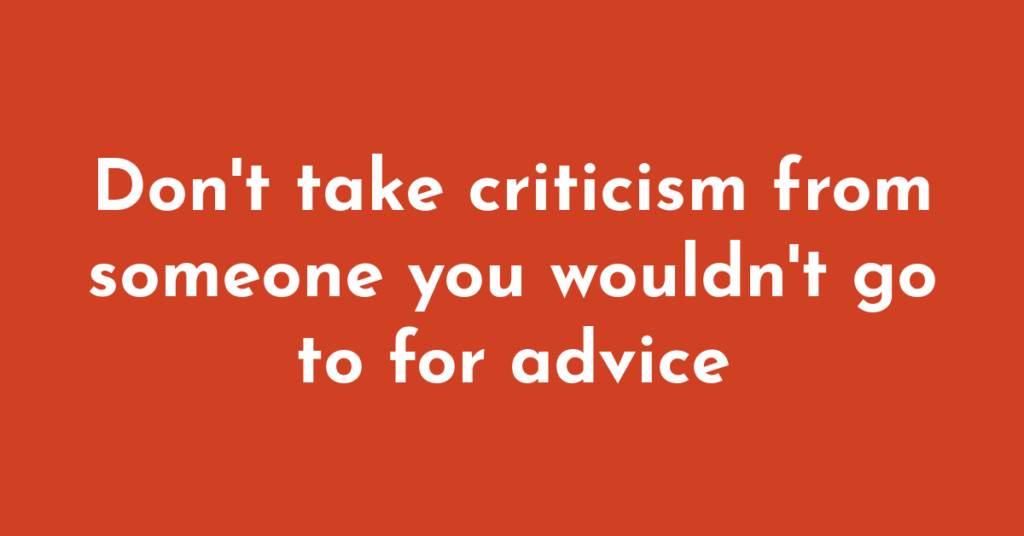Why Is My Teenager Paralysed by Other People’s Opinions?

My friend was showing me her daughter’s school ball photos on the weekend. Her daughter looked stunning. She was wearing an amazing red dress with the flair it deserved. For some reason, 17-year old girls are so much more stylish than we ever were!
Anyway, while we were grumbling about youth being wasted on the young, the dress’ owner walked in, rolled her eyes and said, “You can’t look at them. I look like a Christmas bauble”.
What? She didn’t!
I asked her who told her that and she said it was another Year 12 girl. Just a girl, not a close friend.
I asked her, “Would you go to her for advice?” She shook her head. “Then don’t listen to her criticism.”
I’m a realist, I know I was wasting my breath. Most teens are validation-seeking beings. They want everyone’s good opinion…. but especially their peers’! It can cost them a great deal of upset. Kids don’t discern whose opinion matters. Therefore, they take all criticism to heart. Let’s be honest, a lot of us are the same.
Why are adolescents so vulnerable to other people’s opinions?
In early adolescence, kids start to move their focus from their parents to their peers. It is a stage of development that ensures they eventually find their niche and take their place in society. The cruelty of nature also makes this the time when kids lack the emotional intelligence to be gentle with one another. So, judgements are often very harsh or blurted out inappropriately, and they are quickly internalised.
Ironically, when you talk to kids about these unhappy experiences they will say, “I just want them to like me”. But if you ask, “Do you like them?” They will often timidly say, “Not really”. It’s exasperating, but not surprising when you look at Maslow’s Hierarchy of Motivational Needs.

Maslow proffered that before we are able to develop esteem, including strength, confidence and self-respect, we must first meet the more basic needs of physiological survival, safety, and belonging and love. It’s the belonging that is problematic.
Santa Maria college psychologist, Bethany O’Regan says, “For an adolescent it is not enough to simply be loved and belong at home. They need to belong socially. That means acceptance from peers. Belonging is a deficit need, meaning that the less you have the more you need.”
So, we are essentially putting the cart before the horse to tell kids to have the strength to stand up for themselves or to ignore mean comments. They need their love and belonging needs met first.
Validation seeking is risky business
This natural need to seek the good opinion of peers means that many kids will make silly decisions. Research shows that, even if a child strongly believes they are indifferent to peer opinion, they will still make more risky decisions if they are being watched by people their own age. That lovely, sensible teen you know really might ‘jump off a cliff if their friends were doing it’, they’re just not aware they would!
As you are well aware, social media really isn’t helping. When a young teen posts to social media they will be bombarded with opinions. Adults are always surprised that kids take that risk and open themselves up for so much criticism, but for teens, the pay-off of peer approval is so visual and powerful.

How do we make kids more critical of the opinions they listen to?
To a certain extent it is just time and experience. However, we can provide an environment for that growth.
1. Encourage kids to find friends in lots of different places. They may not find like-minded kids at school who allow them to feel a sense of belonging, but they may find it in sporting groups, clubs, interest groups or their neighbourhood. That sense of belonging will lead to the opportunity for more confidence in their own opinions.
2. Encourage your child to set goals they want to achieve and then work towards them. That internal sense of achievement is a strong factor in the development of self-esteem. We don’t develop strong, lasting self-belief and self-respect by people praising us, it comes from achieving goals we value and work towards.
3. Model the behaviours you want to encourage in your kids. Be conscious of how often you refer to other people’s opinions. Talk about the people whose opinion you value and why. Most of all, talk about how you value your own intuition, beliefs and feelings.
4. Make sure kids are exposed to lots of different role models who have strong self-belief and articulate that confidence. Every child needs a fun, eccentric aunt or uncle with a ‘who cares what people think’ attitude. Enrol those people and make them part of your kids’ lives.
5. Train kids to look for the positives. We have a natural negativity bias that causes us to focus more on negatives than positives. It’s part of our evolution pattern to ensure we are aware of threats. However, it also contributes to our dwelling on negative comments. Simply asking kids daily to tell you what they are grateful for can shift patterns of thought. The negative comments will have a little less power.
So, back to my girl in the red dress
Sometime in the future, when she’s all grown into her adult self, I’m going to look at that photo with the owner of the red dress. She will look at it and realise exactly how perfect she was in every way. Because haven’t we all done that? Don’t we all wish we hadn’t been so hard on ourselves? Don’t we wish we hadn’t listened to those meanies who cut us down?
It’s true…youth is wasted on the young.

The Power of Expectations in Shaping Student Success – Jennifer Oaten
Discover the transformative impact of expectations on student success. Learn how belief shapes outcomes in education and beyond.

Weekly Wrap Up: Term 2, Week 1, 2024
Term 2 has kicked off with a bang! We enjoyed the Year 11 Father-Daughter evening, celebrated Earth Day, and welcomed Dr. Mark Williams.

Inspiring Change: Earth Day 2024
Our Earth Day celebration this week was a powerful reminder of our collective responsibility to protect our planet for future generations.
- Featured, Social-emotional learning
Author: Santa Maria College
Santa Maria College is a vibrant girls school with a growing local presence and reputation. Our Mission is to educate young Mercy women who act with courage and compassion to enrich our world. Santa Maria College is located in Attadale in Western Australia, 16 km from the Perth CBD. We offer a Catholic education for girls in Years 5 – 12 and have 1300 students, including 152 boarders.






